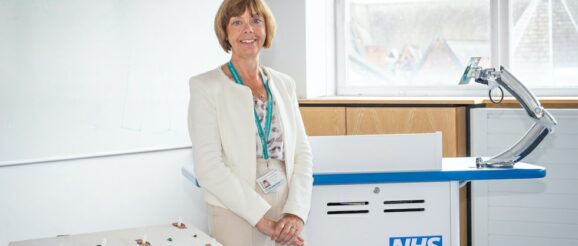New motion detection tool aims to identify Multiple Sclerosis treatments – Med-Tech Innovation

Clinicians and researchers at Leeds Teaching Hospitals NHS Trust have invented a new motion detection tool to help identify treatments for progressive multiple sclerosis and other neurodegenerative conditions.
The project is a collaboration between Leeds Teaching Hospitals NHS Trust, a UK centre for developing new treatments for MS, and the departments of psychology and engineering at the University of Leeds.
The long-term condition affects the brain and spinal cord, causing problems with vision, movement, sensation, and balance. Currently, there are no treatments that stop its progression.
The kinematic tool measures upper limb function by using 3D motion technology to capture finger and wrist markers as patients pick up, move and place objects across a board.
An evaluation led by clinical research fellow Linford Fernandes, a neurology registrar at Leeds Teaching Hospitals NHS Trust, and funded by Leeds Hospitals Charity found the tool can be used to detect progression in dysfunction sooner than current clinical measures.
Professor Helen Ford, consultant neurologist and the research lead for neurosciences at Leeds Teaching Hospitals NHS Trust, said: “We see the device as having significant applications in both research trials and clinical settings.
“We are doing more trials with people with progressive MS and having a sensitive measure of arm function, cognition and thinking is becoming more important. This is especially so if the drugs we are using are shown to be effective because it refines the outcomes.
“The tool could also be really useful for rehabilitation as well as it provides a much better understanding of arm function. Physiotherapists and occupational therapists can monitor improvement, deterioration, and the value of different approaches.
“And because the device is not specific to MS, it could have relevance to other neurodegenerative conditions such as motor neurone disease or Parkinson’s.”
Prof Ford is working with University of Leeds to develop the tool further and apply it to a larger population of patients. It is hoped the tool can be used as a sub-study of the new Octopus trial to find new ways to treat progressive MS.
This multi-arm, multi-stage platform trial is designed to transform the testing of new treatments and could deliver them up to three times faster. Leeds Teaching Hospitals NHS Trust is set to become the first regional hub to open for Octopus and will work in collaboration with clinical researchers at hospitals in Bradford, Hull, Sheffield, and York.
There are an estimated 130,000 people with MS in the UK with 7,000 people newly diagnosed with the condition every year, according to the MS Society.
Prof Ford, who is honorary clinical professor in the University of Leeds’ School of Medicine, has led the development of Leeds as a trial centre for MS treatments over the last decade. She is currently involved with other research projects including ChariotMS, which is testing a repurposed cancer drug to see if it can help maintain the use of arms and hands in progressive MS, and Star MS, which is comparing stem cell transplantation to other highly effective treatments for relapsing MS.
Prof Ford said: “Our research is really motivating. It gives hope to patients who are living with a condition that is incurable. We find that people with MS are incredibly altruistic. Even though they know that emerging treatments might not help them, they might benefit others in the future.”
